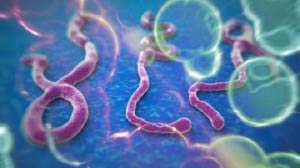By Vivian Collazo Montano*
Havana (Prensa Latina) More than six months ago in Guinea Conakry began an outbreak of Ebola, which quickly spread to other West African nations. Since then, 2,473 people got ill, 1,350 of them died because of it.
In just two days, the World Health Organization (WHO) reported 106 deaths, 95 of them in Liberia, where the situation is more serious and is considered vital to contain the spread of the virus to control the outbreak.
Sierra Leone is the second most problematic country among the four affected in West Africa. It is considered that in these two countries pathogen transmission is high. In Nigeria, the situation is stable, although experts believe that the situation in the region is complex. The number of infections is growing per day, and the disease, which has no specific treatment, maintains a high mortality rate.
However, the successful application of a serum under investigation to two Americans, who were already discharged, opens up new hopes.
Known as ZMapp, the drug had not been tested in humans, but given the situation, WHO accepted the use of investigational treatments with potentially therapeutic or preventive purposes, aiming to save the lives of patients and stop epidemic.
For now, it is also used in Liberian patients with good results, although the same treatment was administered to a Spanish priest, who failed to overcome the disease and died.
A DISEASE ASSOCIATED WITH POVERTY
Otherwise, Margaret Chan, WHO director, admitted that the Ebola outbreak in West Africa is so large, severe and difficult to contain because of poverty.
In an article published in the latest issue of the New England Journal of Medicine, the expert says that the most affected nations, Guinea, Liberia and Sierra Leone are among the poorest in the world.
Years of conflict and civil war left behind serious consequences in their health systems, people mostly destroyed or severely disabled, and in some areas, there is a generation of children with no education, the article said.
In these countries, only one or two doctors are available for every hundred thousand inhabitants, and they are concentrated in urban areas. Isolation rooms, and even the capacity of the hospital to control infection, are practically nonexistent.
Contacts of infected individuals are tracked, but they are not continuously isolated for monitoring, Chan said in the report.
However, he noted that, although the situation is worsening, the response was better in the last two weeks. Help came from various organizations and WHO is supervising the outbreak to identify areas of transmission and ensure that assistance is coordinated and distributed quickly and rationally.
Meanwhile, the Centers for Disease Control and Prevention (CDC), from the United States, are providing strong support in the field, including contact tracing.
Experience shows that the disease can be contained, even without a vaccine or cure, but the combination of poverty, dysfunctional health systems, and fear at work, tells about a distant goal, he said.
The international community will need to be prepared for many more months of massive, coordinated and targeted assistance.
“A human world cannot let West African people suffer on such an extraordinary scale,” the expert concluded.
* Head of the Science and Technology Editorial Department at Prensa Latina News Agency










